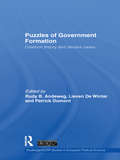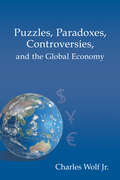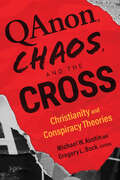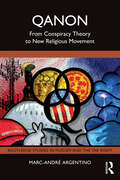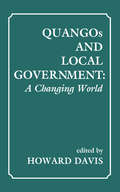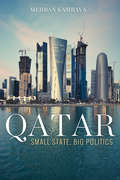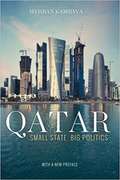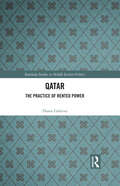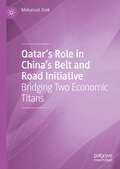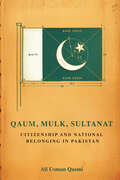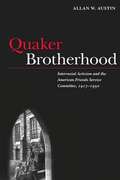- Table View
- List View
Putting the Parts Together: Trade, Vertical Linkages, and Business Cycle Comovement
by Andrei A. Levchenko Julian Di GiovanniA report from the International Monetary Fund.
Putting the Tea in Britain: The Scots Who Made Our National Drink
by Les WilsonFrom the Indian Mutiny to the London Blitz, offering a ‘nice cup of tea’ has been a stock British response to a crisis. But tea itself has a dramatic, and often violent, history. That history is inextricably interwoven with the story of Scotland. Scots were overwhelmingly responsible for the introduction and development of the UK’s national drink, and were the foremost pioneers in the development of tea as an international commodity. This book reveals how Darjeeling, Assam, Ceylon and Africa all owe their thriving tea industries to pioneering work by Scottish adventurers and entrepreneurs. It’s a dramatic tale. Many of these men jeopardised their lives to lay the foundation of the tea industry. Many Scots made fortunes – but it is a story with a dark side in which racism, the exploitation of native peoples and environmental devastation was the price paid for ‘a nice cup of tea’. Les Wilson brings the story right up to date, with a look at the recent development of tea plantations in Scottish hills and glens.
Puzzles of Government Formation: Coalition Theory and Deviant Cases (Routledge/ECPR Studies in European Political Science)
by Patrick Dumont Lieven De Winter Rudy B. AndewegUnderstanding the formation of governments has always been central to political science. Traditionally this topic has been considered from a rational choice theory perspective and the empirical testing of these theories; however neither approach alone is able to explain a large proportion of actual coalition formations. This comparative volume brings together a rational choice theory perspective and the empirical testing of these theories to study government formation. It provides in-depth studies of government formations in Europe that cannot be accounted for by existing coalition theory in order to identify potential explanatory factors that have been neglected so far. These ‘coalition puzzles’ are reconstructed by country experts based on secondary sources, newspaper accounts, internal party documents, and interviews in an effort to understand why particular governments were formed. In conclusion, this book assesses whether new factors can be integrated into rational choice theories or whether these analyses point to the need for a different paradigm. This important volume will be of interest to students and scholars of political science, European politics and comparative politics.
Puzzles, Paradoxes, Controversies, and the Global Economy
by Charles Wolf Jr.In this wide-ranging collection of essays first published between 2007 and 2014, Charles Wolf Jr. shares his insights on the world's economies, including those of China, the United States, Japan, Korea, India, and others. First appearing in such periodicals as in Forbes, the Wall Street Journal, and the Weekly Standard, among others, these chapters take on a range of questions about the global economy. Wolf discusses the paradoxes and puzzles within China's political economy and in its interactions with the United States. He analyzes the shortcomings of Keynesian economics as a response to the 2008 recession, as well as the weaknesses of policies and actions inferred from the theory, and compares those weaknesses with those of austerity policies intended to limit government spending and indebtedness. He also offers his views on economic inequality and where its principal sources may truly lay, China's currency and the continuing controversy about whether and when it may become a major international reserve currency, and many more insights on key economic issues affecting the global economy. Bringing these essays together for the first time in a single volume, including two essays not yet published elsewhere, this book enables the reader to absorb the author's expert perspective during the years in a collection in which the whole is truly greater than the sum of its parts. Each chapter includes a brief "postaudit" in which the author attempts to grade how well or ill the essay seems in retrospect.
Puzzling Identities
by Vincent DescombesAs a logical concept, identity refers to one and the same thing. So how can it describe membership in various groups, as in ethnic and religious identity? Bringing together an analytic conception of identity with a psychosocial understanding, Vincent Descombes demonstrates why a person has more than one answer to the essential question Who am I?
Pädagogik des gesellschaftlichen Ausnahmezustandes: Erziehung Erwachsener in der Corona-Pandemie
by Arnd-Michael Nohl Denise Klinge Burkhard SchäfferDer Band untersucht, wie Regierungen zur Bekämpfung der Corona-Pandemie auf die massenmediale Erziehung der Bevölkerung in Kombination mit der Vermittlung wissenschaftlicher Informationen gesetzt haben. Auch der alltägliche Umgang der Bevölkerung mit den Orientierungszumutungen und Informationen wird rekonstruiert. Analysiert werden u. a. zentrale Politiker:innenreden, wissenschaftliche Podcasts, Corona-Memes und Interviews. Kontrastierungen mit den pädagogisch-politischen Corona-Maßnahmen anderer Länder und eine historische Analyse der Mobilisierung pädagogischer Mittel zur Krisenbekämpfung runden diesen Band ab.
Q: A Voyage Around the Queen
by Craig BrownWith equal measures of wit and wisdom, the author of 99 Glimpses of Princess Margaret draws a deeply original, hilarious, and telling portrait of the Queen herself.She was the most famous person on earth; she first appeared on the cover of Time magazine at the age of three. When she died, few people were old enough to recall a time when she was not alive.Her likeness has been reproduced—in photographs, on stamps, on the notes and coins of thirty different currencies—more than any since Jesus. It is probable that, over the course of her ninety-six years, she was introduced to a greater number of different people than anyone else who has ever lived—likely well over half a million. Yet this most closely observed of all women rarely left any real impression on those she encountered beyond vague notions of her “radiance” and “sense of duty.” A high proportion of those she met can remember what they said to her, but not a word of what she said to them.Up until now, the curious tactic employed by biographers of the Queen has been to ignore what is interesting and to concentrate on what is not. Craig Brown, the author of 150 Glimpses of the Beatles and Hello Goodbye Hello, rejects this formula, bringing his kaleidoscopic approach to the most famous—and most guarded— woman on earth, examining the Queen through a succession of interlocking prisms. With Q, this fantastically funny, marvelously insightful journalist gives us an unforgettable portrait of the omnipresent, elusive Queen Elizabeth II.
QAnon, Chaos, and the Cross: Christianity and Conspiracy Theories
by Edited by Michael W. Austin and Gregory L. Bock&“What is truth?&” said jesting Pilate, and would not stay for an answer. —Francis Bacon Although Christians are followers of the Truth, many find themselves tempted by the alternate &“truths&” offered by conspiracy theories. Christianity and conspiracy theories have had a long, complicated relationship. But today conspiracy theories are bringing our already polarized society to the brink of chaos. QAnon, the Big Lie, and anti-vaccination theories thrive online, disrupting faith communities. This timely essay collection explores the allure of conspiracy theories and their consequences—and ultimately offers gospel-based paths forward. Accessible to all concerned believers, QAnon, Chaos, and the Cross features scholars of religion, ethics, and public life on the following topics: • evaluating evidence and forming beliefs • the Satanic Panic of the 1960s–1990s • understanding scientific methodology • conspiracy theories&’ appeal to those searching for meaning • the consequences of social media and echo chambers • productive dialog with people who hold different opinions • intellectualism in the life of faith • conspiracy theories in Scripture • QAnon&’s religious rhetoric Complete with a guide to reasoning, which outlines both logical fallacies and intellectual virtues, QAnon, Chaos, and the Cross is an indispensable resource for all Christians seeking the truth. Contributors:Chase Andre, Michael W. Austin, Bradley Baurain, Daniel Bennett, Gregory L. Bock, Chad Bogosian, Kevin Carnahan, Jason Cook, Scott Culpepper, Stephen Davis, Garrett J. Deweese, Marlena Graves, Shawn Graves, David Horner, Dru Johnson, Nathan King, Rick Langer, Christian Miller, Timothy Muehlhoff, Michelle Lynn Panchuk, Susan Peppers-Bates, Steven Porter, Kaitlyn Schiess, Aaron Simmons, Domonique Turnipseed, Rachel I. Wightman, Keith Wyma, Eric Yang
QAnon: From Conspiracy Theory to New Religious Movement (Routledge Studies in Fascism and the Far Right)
by Marc-André ArgentinoThis book explores the QAnon movement by examining its history, fluctuations, and evolution, stemming from the likelihood of multiple users behind the “Q” account, as well as from the changes in the sociopolitical landscape since the creation of the movement. It frames QAnon as a lived religion and demonstrates that it has gone through three stages of existence: proto-QAnon, canonical-QAnon, and apocryphal-QAnon.Author Marc-André Argentino argues that QAnon evolved into something more than a conspiracy theory and demonstrates through a comparative analysis that QAnon is more akin to a new religious movement, in particular a hyper-real religion. He explores the role of gender and women in the QAnon movement, followed by an examination of how the QAnon conspiracy theories have legitimized and coordinated targeted gender-based violence. The book provides evidence of the nexus of QAnon and ideologically-motivated violent extremism and criminality. Finally, it examines the evolution of QAnon after the January 6th insurrection, the loss of the 2020 election by Donald Trump, and the disappearance of “Q.” This volume will be of great interest to researchers of conspiracy theories, new religious movements, American politics, and extremism.
QB VII
by Leon UrisA writer must defend himself against a doctor whom he's accused of committing atrocities during World War II For Abe Cady, settlement is not an option when the facts of the Holocaust are on trial. A journalist and screenwriter, Cady produced the definitive account of the Holocaust just after World War II. But Polish doctor Adam Kelno, who was pressed into service in a notorious concentration camp, sues Cady for his book's claim that the doctor conducted terrible experiments on camp inmates. The libel trial that follows tears open old wounds, disrupts lives, and becomes a battle for justice on behalf of tens of thousands of lost and damaged souls. QB VII is a gripping drama, largely based on author Uris's own protracted libel defense against a former concentration camp surgeon named in his novel Exodus. It was made into the first miniseries in television history. This ebook features an illustrated biography of Leon Uris including rare photos from the author's estate.
QCA with R: A Comprehensive Resource
by Adrian DuşaThis book is a comprehensive guide to qualitative comparative analysis (QCA) using R. Using Boolean algebra to implement principles of comparison used by scholars engaged in the qualitative study of macro social phenomena, QCA acts as a bridge between the quantitative and the qualitative traditions. The QCA package for R, created by the author, facilitates QCA within a graphical user interface. This book provides the most current information on the latest version of the QCA package, which combines written commands with a cross-platform interface. Beginning with a brief introduction to the concept of QCA, this book moves from theory to calibration, from analysis to factorization, and hits on all the key areas of QCA in between. Chapters one through three are introductory, familiarizing the reader with R, the QCA package, and elementary set theory. The next few chapters introduce important applications of the package beginning with calibration, analysis of necessity, analysis of sufficiency, parameters of fit, negation and factorization, and the construction of Venn diagrams. The book concludes with extensions to the classical package, including temporal applications and panel data. Providing a practical introduction to an increasingly important research tool for the social sciences, this book will be indispensable for students, scholars, and practitioners interested in conducting qualitative research in political science, sociology, business and management, and evaluation studies. <P><P><i>Advisory: Bookshare has learned that this book offers only partial accessibility. We have kept it in the collection because it is useful for some of our members. Benetech is actively working on projects to improve accessibility issues such as these.</i>
QUANGOs and Local Government: A Changing World
by Howard DavisThere is now an appointed world of local governance sitting alongside elected government.this publication seeks to develop understanding of the changing world of local governance and thus contribute to wider debates. The impact of these changes will continue to be felt for many years to come whoever is in government.
QUE PIENSAN LOS QUE NO PIENSAN...(EBOOK)
by Diana Cohen AgrestEl matrimonio homosexual, la homoparentalidad, el aborto, la eutanasia voluntaria y el suicidio asistido, la prostitución, la venta de órganos, el alquiler de vientre, la pena de muerte, la tenencia de drogas, el perfil genético de los delincuentes... todos estos temas son hoy el centro de debates tan resonantes como inconclusos. Pues dudamos de todo aquello que puede ser hecho y, en un único gesto, de qué debe ser hecho. En circunstancias imposibles de ser procesadas y asimiladas, inmersos en situaciones límite sobre las cuales, tarde o temprano, deberemos pronunciarnos. Deslizándose en los márgenes de lo "políticamente incorrecto", este nuevo ensayo de Diana Cohen Agrest nos acerca las razones esgrimidas en torno de estas prácticas polémicas que, de otro modo, suelen permanecer confinadas en los círculos de los especialistas. La premisa básica que atraviesa esta obra es la necesidad de alentar el pluralismo, que implica la coexistencia, en igualdad de condiciones, de diferentes perspectivas desde las cuales reflexionar sobre la realidad que nos toca. Lejos de adoptar una posición que clausure el debate, la autora ofrece los argumentos a favor y en contra de cada una de esas cuestiones, desafiando al lector a tomar una decisión crítica propia. A todos nos gusta opinar fundando nuestras creencias en razones valiosas. Porque sentimos que así colaboramos en la construcción de un mundo un poco mejor. Si el don de la palabra instaura con el hombre el universo simbólico, podemos ser partícipes de la construcción de aquellos valores que, hoy como siempre, deberían sostener cualquier conducta humana. Qué piensan los que no piensan como yo? contribuye a este fin con claridad, profundo conocimiento y valentía.
QUE SIGNIFICA SER PROGRESISTA EN (EBOOK)
by Fernando IglesiasEn 2004 Fernando A. Iglesias sacudió a intelectuales, políticos y periodistas con la publicación de Qué significa hoy ser de izquierda? Reflexiones sobre la democracia en los tiempos de la globalización. Aquel ensayo, lúcido y descarnado, irónico y valiente, ponía en cuestión la comodidad de un ideario de izquierda que había quedado desactualizado y proponía nuevos debates acordes al cambio de los tiempos. Cinco años más tarde, Iglesias "hoy diputado nacional por la Coalición Cívica" vuelve a definir el mapa del progresismo argentino proponiendo un modelo ético, republicano y con una nueva distribución del ingreso para nuestro país. Continuación de su trabajo de 2004, Qué significa ser progresista en la Argentina del siglo XXI? pone la discusión en las coordenadas de tiempo y espacio locales, en el país gobernado por el matrimonio Kirchner y en las dificultades de la oposición para construir un modelo alternativo y progresista. Qué significa ser progresista en la Argentina del siglo XXI? discute e ilumina las distintas confusiones del debate político contemporáneo: los límites del nacionalismo y del populismo, el fin del industrialismo que caracterizó al siglo anterior, la cuestión del campo y el análisis de la política kirchnerista como una variedad "débil" del estalinismo, entre otras. En el Parlamento, Fernando A. Iglesias sigue siendo una rara avis. Como intelectual, mantiene su independencia y su sentido crítico. Como político, la lucidez de sus intervenciones en la Cámara de Diputados y en los medios de comunicación lo destacan de la mayoría de sus colegas. Qué significa ser progresista en la Argentina del siglo XXI? es una invitación a recorrer las ideas de una de las voces más originales surgidas del campo intelectual en los últimos años.
QUEM É VOCÊ? Ella A Princesa Encantada
by Osvaldo Cruz Rosaria L. CalafatiUma bela estória sobre uma princesa careca que aprende a acreditar em si mesma! Em um lindo reino, escondido além da Floresta Encantada, vivia uma jovem princesa chamada Ella. Muito diferente das outras princesas: Ella não tinha cabelo. Na maioria das vezes tenta esconder a cabeça com tiaras, lenços bandanas e chapéus; e também não gosta de se olhar no espelho. A Princesa Ella constantemente sonha um dia explorar além das imponentes portas do castelo. No entanto, para fazer isso, ela precisa atravessar o Salão Real, mas há tantos espelhos temidos nas paredes. Esses espelhos são os guardiões da fortaleza e não deixam ninguém passar a menos que a pessoa seja reconhecida. Junte-se à Princesa Ella em sua primeira aventura pelo Salão Real! Por que os espelhos não conhecem Ella? O que a pequena terá que fazer para sair de seu quarto e explorar Floresta Encantada?
Qatar and the 2022 FIFA World Cup: Politics, Controversy, Change
by Danyel Reiche Paul Michael BrannaganThis book offers the first, full academic analysis of the Qatar 2022 FIFA World Cup. Adopting an international relations perspective, the authors critically interrogate the politics and controversy that has surrounded arguably the most controversial sports event ever. In doing so, this text offers up an imperative examination of Qatar’s desired objectives through their investment in global sport and sports events, as well as provides readers with an academic explanation on why major event hosts – such as Qatar – receive so much international scrutiny in the pre-event stage of the event hosting process. On the back of this international scrutiny, this text also provides the first full analysis on how such negative scrutiny has forced Qatar to implement various social-political changes at home.
Qatar: Selected Issues (Imf Staff Country Reports #Country Report No. 14/109)
by International Monetary Fund. Middle East and Central Asia Dept.A report from the International Monetary Fund.
Qatar: Small State, Big Politics
by Mehran KamravaThe Persian Gulf state of Qatar has fewer than 2 million inhabitants, virtually no potable water, and has been an independent nation only since 1971. Yet its enormous oil and gas wealth has permitted the ruling al Thani family to exert a disproportionately large influence on regional and even international politics. Qatar is, as Mehran Kamrava explains in this knowledgeable and incisive account of the emirate, a "tiny giant": although severely lacking in most measures of state power, it is highly influential in diplomatic, cultural, and economic spheres.Kamrava presents Qatar as an experimental country, building a new society while exerting what he calls "subtle power." It is both the headquarters of the global media network Al Jazeera and the site of the U.S. Central Command’s Forward Headquarters and the Combined Air Operations Center. Qatar has been a major player during the European financial crisis, it has become a showplace for renowned architects, several U.S. universities have established campuses there, and it will host the FIFA World Cup in 2022. Qatar’s effective use of its subtle power, Kamrava argues, challenges how we understand the role of small states in the global system. Given the Gulf state’s outsized influence on regional and international affairs, this book is a critical and timely account of contemporary Qatari politics and society.
Qatar: Small State, Big Politics
by Mehran KamravaThe Persian Gulf state of Qatar has fewer than 2 million inhabitants, virtually no potable water, and has been an independent nation only since 1971. <P><P>Yet its enormous oil and gas wealth has permitted the ruling al Thani family to exert a disproportionately large influence on regional and even international politics. <P><P>Qatar is, as Mehran Kamrava explains in this knowledgeable and incisive account of the emirate, a "tiny giant": although severely lacking in most measures of state power, it is highly influential in diplomatic, cultural, and economic spheres. Kamrava presents Qatar as an experimental country, building a new society while exerting what he calls "subtle power." It is both the headquarters of the global media network Al Jazeera and the site of the U.S. Central Command's Forward Headquarters and the Combined Air Operations Center. Qatar has been a major player during the European financial crisis, it has become a showplace for renowned architects, several U.S. universities have established campuses there, and it will host the FIFA World Cup in 2022. Qatar's effective use of its subtle power, Kamrava argues, challenges how we understand the role of small states in the global system. Given the Gulf state's outsized influence on regional and international affairs, this book is a critical and timely account of contemporary Qatari politics and society.
Qatar: The Practice of Rented Power (Routledge Studies in Middle Eastern Politics)
by Diana GaleevaThis book explains the parameters of Qatar’s political growth by developing an alternative theory of power – ‘rented’ power. The author demonstrates how Qatar’s emergence as a regional power can be solely explained by its capacity as a gas-rich rentier state. By using Qatar as an empirical case study of the ‘rented’ power theory, readers will gain insight into Qatar’s engagement with non-state actors (political Islam, tribes, media, sports, and others) to wield its power, allowing Qatar to ‘rent’ the well-established influence of non-state actors due to their transnational nature. The Qatari case demonstrates a state’s ability to establish a patron-client relationship with non-state actors, overcoming limitations set by size or military strength to gain international influence. This book is accessible to a wide readership: it will be of interest of scholars, postgraduates, journalists, policy experts, and a general audience whose interests include the politics of the Middle East and the GCC states particularly
Qatar’s Nation Branding and Soft Power: Exploring the Effects on National Identity and International Stance (Contributions to International Relations)
by Nourollah Zarrinabadi Nawaf Al-Tamimi Azzam AminThis open access book examines how creating a national brand assisted Qatar in absorbing the shock and awe following the outburst of the crisis with Saudi Arabia, Bahrain, Egypt, and the United Arab Emirates in May 2017. The authors discuss the country's diplomatic performance, which was characterized by five main factors that helped Qatar to deal with the crisis successfully. These factors include the failure of the element of surprise, years of building Qatar’s national brand, Qatar's arsenal of soft power, international alliances, and the opponents’ quandary. This book further scrutinizes Qatar’s role in the region and all questions related to this role through the lenses of its nation brand. The book provides explanations for the success of Qatar in absorbing the “shock and awe” in the early stage of the last Gulf crisis, presenting various arguments on how establishing a nation brand helped Qatar to deal with the crisis successfully. The book follows an original approach that views the Qatari case from a scientific perspective, investigating the art of nation branding. It will appeal to students, researchers, and scholars of international relations, psychology, political science, and journalism, as well as policy-makers interested in a better understanding of soft power, nation branding, Middle East studies, and diplomacy.
Qatar’s Role in China’s Belt and Road Initiative: Bridging Two Economic Titans
by Mohamad ZreikThis book provides a detailed analysis of Qatar’s participation in China’s Belt and Road Initiative (BRI). With a particular focus on its economic, social, and geopolitical impacts, it examines how Qatar has used its position within the BRI framework to diversify its economy, strengthen global integration, and increase international trade. By critically exploring the potential risks of the BRI, the dangers of economic dependency, geopolitical tensions, and sustainability are explored in relation to Qatar’s long-term development. This book offers new insights into the ways that small states can leverage international initiatives for economic diversification and development. It will be relevant to students, researchers, and policymakers interested in economic development, the political economy, and global trade.
Qaum, Mulk, Sultanat: Citizenship and National Belonging in Pakistan (South Asia in Motion)
by Ali Usman QasmiAfter the trauma of mass violence and massive population movements around the partition of India and Pakistan in 1947, both new nation states faced the enormous challenge of creating new national narratives, symbols, and histories, as well as a new framework for their political life. While leadership in India claimed the anti-colonial movement, Gandhi, and a civilizational legacy in the subcontinent, the new political elite in Pakistan were faced with a more complex task: to carve out a separate and distinct Muslim history and political tradition from a millennium long history of cultural and religious interaction, mixing, and coexistence. Drawing on a rich archive of diverse sources, Ali Qasmi traces the complex development of ideas of citizenship and national belonging in the postcolonial Muslim state, offering a nuanced and sweeping history of the country's formative period. Qasmi paints a rich picture of the long, arduous, and often conflict-ridden process of writing a democratic constitution of Pakistan, while simultaneously narrating the invention of a range of new rituals of state—such as the exact color of the flag, the precise date of birth of the national poet of Pakistan, and the observation of Eid as a "national festival"—providing an illuminating analysis of the practices of being Pakistani, and a new portrait of Muslim history in the subcontinent.
Quagmire in Civil War
by Jonah Schulhofer-WohlOur understanding of civil war is shot through with the spectre of quagmire, a situation that traps belligerents, compounding and entrenching war's dangers. Despite the subject's importance, its causes are obscure. A pervasive 'folk' notion that quagmire is intrinsic to certain countries or wars has foreclosed inquiry, and scholarship has failed to identify quagmire as an object of study in its own right. Schulhofer-Wohl provides the first treatment of quagmire in civil war. In a rigorous but accessible analysis, he explains how quagmire can emerge from domestic-international interactions and strategic choices. To support the argument, Schulhofer-Wohl draws upon field research on Lebanon's sixteen-year civil war, structured comparisons with civil wars in Chad and Yemen, and rigorous statistical analyses of all civil wars worldwide fought between 1944 and 2006. The results make clear that the 'folk' notion misdiagnoses quagmire and demand that we revisit policies that rest upon it. Schulhofer-Wohl demonstrates that quagmire is made, not found.
Quaker Brotherhood: Interracial Activism and the American Friends Service Committee, 1917-1950
by Allan W. AustinThe Religious Society of Friends and its service organization, the American Friends Service Committee (AFSC) have long been known for their peace and justice activism. The abolitionist work of Friends during the antebellum era has been well documented, and their contemporary anti-war and anti-racism work is familiar to activists around the world. Quaker Brotherhood is the first extensive study of the AFSC's interracial activism in the first half of the twentieth century, filling a major gap in scholarship on the Quakers' race relations work from the AFSC's founding in 1917 to the beginnings of the civil rights movement in the early 1950s. Allan W. Austin tracks the evolution of key AFSC projects such as the Interracial Section and the American Interracial Peace Committee, which demonstrate the tentativeness of the Friends' activism in the 1920s, as well as efforts in the 1930s to make scholarly ideas and activist work more theologically relevant for Friends. Documenting the AFSC's efforts to help European and Japanese American refugees during World War II, Austin shows that by 1950, Quakers in the AFSC had honed a distinctly Friendly approach to interracial relations that combined scholarly understandings of race with their religious views. In tracing the transformation of one of the most influential social activist groups in the United States over the first half of the twentieth century, Quaker Brotherhood presents Friends in a thoughtful, thorough, and even-handed manner. Austin portrays the history of the AFSC and race--highlighting the organization's boldness in some aspects and its timidity in others--as an ongoing struggle that provides a foundation for understanding how shared agency might function in an imperfect and often racist world. Highlighting the complicated and sometimes controversial connections between Quakers and race during this era, Austin uncovers important aspects of the history of Friends, pacifism, feminism, American religion, immigration, ethnicity, and the early roots of multiculturalism.


